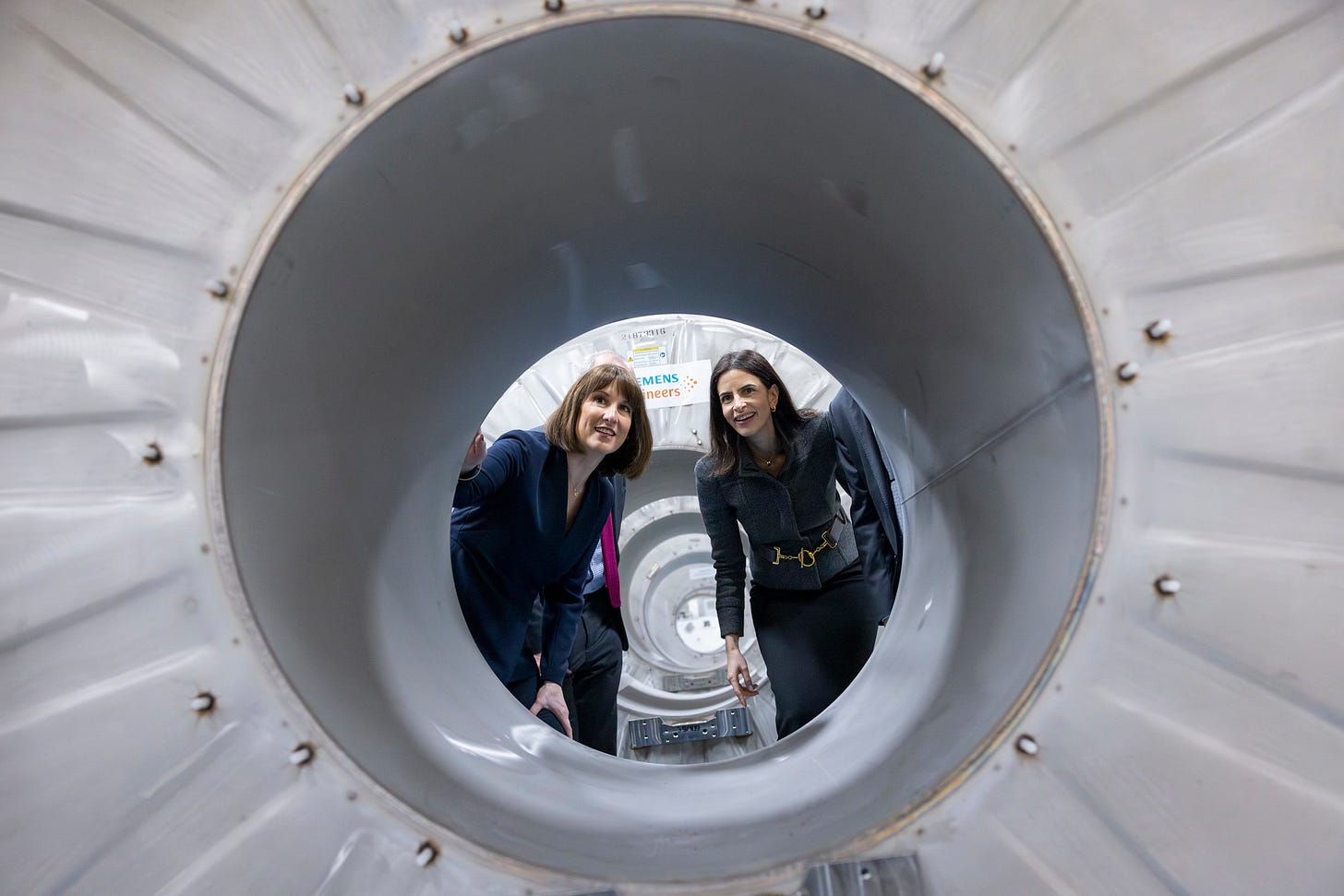
Discover more from REACTION
Can Reeves turn vision for “Europe's Silicon Valley" into reality?
Just because something isn’t a new idea doesn’t mean it’s not a good one. On the contrary, it’s easy to see why the Ox-Cam arc has long been dreamed of.
Rachel Reeves’s big growth speech today has been criticised for its distinct lack of fresh ideas. While the Chancellor throwing her support behind Heathrow expansion is perhaps the most obvious example, the same can be said for her plan to create “Europe's Silicon Valley".
Speaking from Oxfordshire this morning, Reeves vowed to create an economic arc between Britain's two most famous university cities, through expanded train lines and road upgrades, a housing boom and a new “innovation hub” attached to Cambridge University.
“The Oxford and Cambridge Growth Corridor”, she insisted, “could add up to £78 billion to the UK economy by 2035”.
Sound familiar?
Labour’s plans to properly connect the south-east are a repackaging of the “Oxford-Cambridge Arc” discussed by Rishi Sunak and Jeremy Hunt. In fact, as Reeves herself acknowledged, they predate Sunak and Hunt too. The Ox Cam arc was initially launched in 2003 – over 20 years ago.
This time round, the Chancellor vowed to go “further and faster” than ever before to turn vision into reality. Some progress, she insisted, has already been made: “I can confirm today that the Environment Agency have now lifted their objections to new development in Cambridge, following this government’s intervention to address water scarcity,” said Reeves, “which means 4,500 additional homes, new schools, and new office, retail and laboratory space can be built.”
Just because something isn’t a new idea doesn’t mean it’s not a good one. On the contrary, it’s easy to see why the Ox-Cam arc has long been dreamed of.
Oxford and Cambridge, renowned for science and innovation and home to two of the best universities on the planet, offer huge potential for Britain’s growth prospects. Yet it takes over two and a half hours to travel between these cities by train, despite them being just 66 miles apart.
It would not be difficult to persuade global investors that putting money into an integrated grand development plan to turn two of the world’s greatest centres of learning into a Silicon Valley-like super city is money well spent.
Though this raises another question: if the plan is such a non-brainer, then why hasn’t it been executed sooner?
Successive governments have failed to see through this growth-enhancing project in part due to a lack of clear planning and coordination between government departments on key infrastructure projects and in part due to local opposition.
The Stop the Arc Group has been campaigning against large-scale housing development plans and an East West Rail line between the two cities, citing concerns over the environment and loss of farmland. Which has stifled progress even on what is considered the project’s "first essential”: a better train connection between Oxford and Cambridge.
Reeves will encounter these difficulties too, and the government will be worried about losing support in marginal seats. Opposition to the arc will become a general election issue in those seats, presumably.
However, the size of Labour’s majority will make it easier to flatten the sort of opposition that has prevented or critically delayed these sorts of plans in the past.
For those wanting to see Europe's Silicon Valley finally come to life, that creates room for optimism.
The trouble for Reeves, however, is that this is a long-term growth plan, and not a quick fix for a stagnating economy. Meaning it won’t take any immediate pressure off the government.
Caitlin Allen
Deputy Editor
ON REACTION TODAY
David Waywell
The fundamental misunderstanding at the heart of the AI revolution
ALSO KNOW
Majority support for capital punishment - A majority of Britons support reinstating the death penalty in the UK, with support especially strong amongst Millennials, according to a new poll by think tank More in Common. Support has increased from 50% to 55% since 2023, and opposition has fallen from 37% to 32%.
Missiles sent from Israel to Ukraine - About 90 Patriot air defense interceptors are being sent from Israel to Ukraine this week in a transfer facilitated by the US military which aims to help Kyiv defend against Russia's attacks on its critical infrastructure. This is also the most significant delivery of weapons from Israel to Ukraine since Putin’s full-scale invasion began.
Hand over Assad - In the first meeting with Kremlin officials in Damascus since taking power, Syria’s new ruler, Ahmad Al Shara, has demanded that Russia hand over former president Bashar Al Assad, currently in exile in Moscow, and an estimated $2 billion in liquid assets held by the exiled dictator's family in Russian banks, in return for allowing Moscow to maintain its military bases in the Middle Eastern country.
CNB governor proposes $7 billion Bitcoin reserve - Governor Aleš Michl has proposed diversifying the Czech National Bank by converting billions of euros of the country’s reserves into Bitcoin. This would be the first time that a western monetary institution has taken this step. Should the board approve his proposal in meeting on Thursday, the CNB could, according to Michl, eventually hold as much as 5% of its €140B of reserves in Bitcoin.
FIVE THINGS
The FT’s Tech Tonic discuss China’s AI “Sputnik moment”
Andrew Wilton in Engelsberg Ideas on Turner’s genius for technology
Years before Tulsi Gabbard became Trump’s pick to coordinate U.S. spy agencies, she tried to evade unwanted scrutiny, reports the Wall Street Journal
Trump’s aggressive foreign policy towards Latin America could push regional governments into China’s arms, warns Oliver Stuenkel in Foreign Policy.
How wildlife survives after wildfires. Isabella Kaminski in BBC Future.







